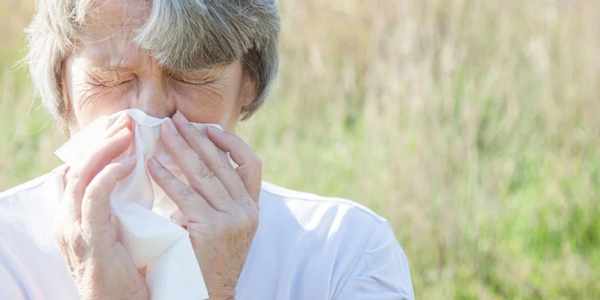Spring in the Midwest, with its growing greenery and flowers, is like a breath of fresh air after a long winter. Unfortunately for some, however, new growth means that the air is also full of pollen, setting off allergies in residents young and old. Whether you’ve suffered spring allergies your whole life, or if your symptoms have worsened as you got older, hay fever can be serious for seniors. Here are 6 tips to manage your allergies when there’s pollen in the air.
1. Learn allergy symptoms
As we age, our immune systems tend to get weaker. For some people, this means that their allergy symptoms actually improve or disappear, as their bodies stop recognizing the pollen that enters their systems as a threat. For others, their allergy symptoms can remain unchanged or even worsen.
Learning what seasonal allergy symptoms look like is critical to managing them for yourself or for your loved ones. The main symptoms are:
- Runny nose
- Watery or itchy eyes
- Sneezing
- Coughing
- Dark circles under the eyes
These symptoms may seem harmless enough, but they can cause extreme discomfort and complicate treatment of other conditions. Seniors living with dementia may be unable to communicate their discomfort, so you should always know the signs.
2. Avoid high pollen days
The amount of pollen in the air can vary from day to day, or even hour to hour, so plan your time outdoors to avoid especially high pollen counts. Many weather services report on the pollen count during the weather forecast in spring, and if it’s not broadcast, you can always find it online.
If you’re not near a television, computer, or smartphone, there are some basic guidelines for how high the pollen count will be: stay inside if the weather is warm and dry, or dry and windy. Pollen count is usually highest from 5am to 10am every day, then falls as the day goes on. The best time for people with spring allergies to be outside is after a heavy rainfall, when pollen is stuck to the ground by moisture. By staying indoors and minimizing your exposure to pollen, you can keep your symptoms manageable.
3. Wear the right clothes when you're outside
Sometimes, staying inside is a tall order when the weather is beautiful, and getting fresh air, sun, and exercise is a good idea for people of all ages. When you do go outside, be sure you’re wearing clothing that can help you keep the pollen at bay. Sunglasses are a must to prevent pollen from getting in your eyes and irritating them. A hat, headscarf, or bandana keeps irritants out of your hair that can fall into your eyes and nose later, and long sleeves and pants allow for easy cleaning when you return indoors.
Even with proper attire, avoiding the outdoors during times when pollen levels are high is always going to be more effective than covering up, but if you can’t plan around it, be sure you’re protecting yourself when you go outside.
4. Keep your house pollen-free
It’s close to impossible to keep all allergens out of your home, especially if you’re always coming and going, but there are several strategies to keep your house as pollen-free as possible.
First, avoid opening windows, even though it may be tempting. If you get too warm, use fans or ideally, your air conditioner, as it can help remove pollen that may have gotten into your home. Second, wash your hands and shower often, especially when you come inside after being exposed to high pollen levels. Pollen on your skin and hair can easily fall off and circulate throughout your house. Third, after being outdoors, change your clothes immediately and put the clothes that have been exposed to pollen in the washing machine. This isolates all irritants, and the wash cycle will get rid of them so your clothes are ready for their next wear.
Discover Vista Springs’ Hypoallergenic Rooms
5. Eat immune-boosting foods
Foods that boost your immune system can help you manage your seasonal allergy symptoms, but none have been proven as a tried-and-true treatment for allergies. Try some of these foods in your springtime diet and see what works for you:
- Apples:
- Apples, as well as berries, garlic, onions, cabbage, and cauliflower contain quercetin, a bioflavonoid that can help prevent your body’s immune cells from releasing histamines, which causes allergy symptoms.
- Strawberries:
- The Vitamin C combined with the quercetin in strawberries make these sweet fruits a powerful immune booster that also suppress histamines.
- Fatty Fish:
- Omega-3 fatty acids are a great way to reduce inflammation, and therefore help keep allergic reactions from causing too much damage. Fatty fish such as salmon, tuna, trout, and mackerel are delicious sources of omega-3, which is also great for heart health and memory.
- Yogurt:
- Probiotics, such as the live bacteria found in yogurt, kefir, and fermented vegetables like sauerkraut and kimchi, are healthy for your digestive system and your immune system. Use caution, however, as dairy and the natural histamines in fermented foods could actually make your symptoms worse.
6. Talk to your doctor
As with all conditions, from allergies to illnesses, you should always consult your primary care doctor or another healthcare professional about the best approach to handling your health. The treatment most commonly used to treat allergies, antihistamines, are not recommended for seniors as they can interfere with other medications or have more severe side effects than in younger adults. A doctor will be able to determine the best way to manage or treat your allergy symptoms.
Suffering from seasonal allergies can put a rain cloud over the nice spring weather, but by knowing how to manage your symptoms, you can still make the most of the season. And if getting outside does more harm than good during spring? Don't worry, summer promises better weather and lower pollen counts.





